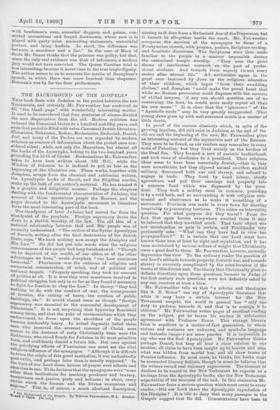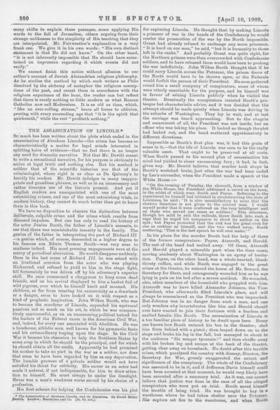THE BACKGROUND OF THE GOSPELS.* Tius book deals with Judaism
in the period between the two Testaments, and certainly Mr. Fairweather has contrived to fill "the, blank page" with wonderfully interesting matter. It used to be considered that four centuries of silence divided. the new dispensation from the old. Modern criticism has reduced the Canonical hiatus to a hundred and fifty years, and even that period is filled with extra-Canonical Jewish literature. Chronicles, Nehemiah, Esther, Ecclesiastes, Zechariah,
Joel, and many of the Psalms are now regarded by modern -scholars as sources of information about the period once con- sidered silent; while not only the Maccabees, but almost all the books of the Apocrypha, belong to the two hundred years ,preceding the birth of Christ. Ecclesiasticus Mr. Fairweather takes to have been written about 132 B.C., while the -Wisdom of Solomon he is inclined to put as late as the 'beginning of the Christian era. These works, together with ,josephus, scraps from the classical and rabbinical writers, the Apocalyptic books of Enoch, and the Sibylline oracles, ,make up the bulk of our author's material. He has treated it in a graphic and delightful manner. Perhaps the chapters 'dealing with the fundamental characteristics of Judaism, the account of those mysterious people the Essenes, and the Pages devoted to the Apocalyptic movement in literature form the most interesting part of the book.
The standpoint of later Judaism had moved far from the 'standpoint of the prophets. Foreign supremacy drove the . Jews to a slavish worship of the law. The old idea of a national relationship between God and His people was of necessity undermined. "The author of the Syriac Apocalypse 'of Baruch, writing after the final destruction of the Jewish -State, says, We have nothing now except the Almighty and Ilia Law.'" He did but put into words what the religious -oonsciousnesa of the people had long foreshadowed. "Though 'Nve be deprived of our wealth, of our cities, or of the other -advantages we have," wrote Josephus, "our Law continues immortal." Plutrisaism was the outcome of religious and :Ceremonial concentration of mind, and of political and 'llational despair. "Properly speaking, they took- no account of politics at all. It is true they were sometimes involved in .political struggles, but only in so far as they found it necessary to fight for freedom to obey the Law." In theory, "they had liothing to do with the conduct of war, the arrangement :of treaties, the raising of taxes, the erection of public 'buildings, etc." It would almost seetn as though "foreign 'supremacy was essential to the successful development of l'harisaism." It is not surprising that hypocrisy flourished among them, and that the yoke of ceremonialism which they endeavoured to force upon the shoulders of the people °became intolerably heavy. In actual dogmatic belief these ineu who incurred the severest censure of Christ were
,nearer to the doctrine of early Christianity than were the Sadducees, who stood firmly for Judaism in its most primitive
fOn, and confidently denied a future life. But over against 'the petrifying effects of Pharisaisin one must set the vital 'religious influence of the 'synagogue. "Although it is difficult
-to trace the origin of this great institution, it was undoubtedly post-exilio, and perhaps later than is usually supposed." In
,
the time of our Lord these houses of prayer were schools and 'churches in one. Philo declares that the synagogues were "none other than institutions for teaching prudence and bravery,
.tsPerance and ,justice, piety and holiness ; in short, every 711.tue which the .human and the Divine recognises and 11573.31) B." This is, of course, a much idealised description, Th4 ltack . • or, and T. 041110.wriessofutori Gorda By William Fairwoather, XL. London:
coming as it does from a Hellenised Jew of the Dispersion, but it cannot be altogether beside the mark. -Mr. Fairweather compares the services of the synagogue to those of a Presbyterian church, with prayers, psalms, Scripture-reading, and homiletic discourses. The Scriptures wore thus made familiar to the people in a manner impossible during the centralised temple worship. "They were the great theme of intellectual research on the part of profes- sional students. And towards them eagerly turned every seeker after eternal life." All authorities agree in the great care bestowed by Jews on the religious education of their children, which began "from their swaddling clothes," and Josephine "could make the proud boast that while no Roman procurator could dispense with the services of skilled lawyers, if any one should question one of us concerning the laws, he would more easily repeat all than his own name.'" It is clear that the " ignorance " of the "Apostolic circle" may be very greatly exaggerated. That young Jews grew up with well-exercised minds is a matter of little doubt.
In proof of the curious elasticity which, in spite of the growing legalism, did still exist in Judaism at the end of the
old era and the beginning of the now, Mr. Fairweather gives an interesting account of the mysterious sect of the Essence.
They were to be found, as our readers may remember, in every town of Palestine, but they lived mainly on the borders of the Dead Sea. They formed a sort of esoteric brotherhood, and took vows of obedience to a president. Their religious
ideas seem to have been essentially Jewish,—that is, they were monotheists, but they abjured animal sacrifice, exalted
celibacy, denounced both war and slavery, and refused to engage in trade. They lived by band labour, chiefly agriculture, and put their earnings and property into a common fund which was dispensed by the presi- dent. They took a midday meal in common, preceding it by a cold bath, and so surrounding it with religious cere- monial and observance as to make it something of a sacrament. Provision was made in every town for showing hospitality to journeying brethren. This raises an interesting question. For what purpose did they travel P From the fact that open houses everywhere awaited them it may be inferred that they travelled much. That their object was not merchandise or gain is certain, and Friedliinder very pertinently asks: "What can they have had in view but propagandism ?" It is certain that our Lord must have known these men at least by sight and reputation, and it has been maintained by various writers of weight that Christianity owes a good deal to them. Mr. Fairweather, however, earnestly deprecates this view. To the ordinary reader the question of our Lord's attitude towards property, towards war, and towards slavery is curiously complicated by the consideration of the tenets of this Jewish sect. The theory that Christianity gives no definite directions upon these questions, because in Judea of the first century such questions wore not definitely asked by any ono, receives at least a blow.
Mr. Fairweather tells us that "a scholar and theologian like A. B. Bruce" can say of Apocalyptic literature that while it may have a certain interest for the New Testament exegete, the world in general has "only one duty to perform towards it, and that is to consign it to oblivion." Mr. Fairweather writes pages of excellent reading on the subject, yet he leaves his readers in substantial agreement with Professor Bruce. This strange literary form is repellent in a matter-of-fact generation, to whom visions and ecstasies are unknown, and symbolic language and fantastic imagery are mere puzzles. It is impossible to say who was the first Apocalyptist. Mr. Fairweather thinks perhaps Daniel, but they all bear a close relation to one another, all claim to have been caught up to heaven and seen what was hidden from mortal ken, and all show traces of -Persian influence. In most oases, he thinks, the books must be accounted literary fictions, though in some he believes that the writers record real visionary experiences. The element of dualism to be traced in the Now Testament he regards as a heritage from the Apocalyptic books, also the New Testament
expectation of the nearness of the end. In this connexion Mr. Fairweather faces a serious question which must occur to every reader,—Did our Lord share the Apocalyptic expectation of the Disciples P It is idle to deny that many passages in the Gospels suggest that He did. Commentators have been ttb many shifts to explain these passages, some applying His words to the fall of Jerusalem, others arguing from their strange unlikeness to the simplicity of His teaching that they are interpolated. Mr. Fairweather's explanation is a very frank one. We give it in his own words : "His own distinct statement is that He did not know." On the other hand, "it is not inherently impossible that He should have enter- tained an impression regarding it which events did not verify."
. We cannot finish this notice without allusion to our author's account of Jewish Alexandrian religious philosophy. As he studies the method by which such writers as Philo dissolved by the alchemy of metaphor the religious concep- tions of the past, and recast them in accordance with the religious experience of the hour, the reader can but reflect that there is surely nothing so little modern as what Roman Catholics now call Modernism. It is as old as time, which, " like an ever-rolling stream," bears all forms to oblivion, proving with every succeeding age that "it is the spirit that quickeneth," while the rest " profiteth nothing."







































 Previous page
Previous page